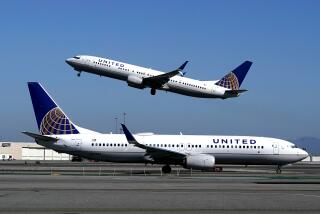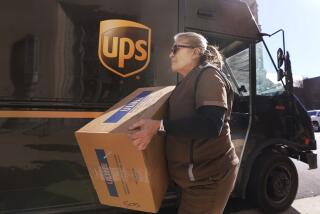Clock Is Ticking on United’s Chance for Government Loan
- Share via
It’s crunch time for United Airlines.
With its losses mounting daily, the struggling carrier is weighing whether to ask Uncle Sam for help in the form of a government loan guarantee. But the deadline for applying for a guarantee is June 28, so the unit of UAL Corp. must quickly decide before that window shuts for good.
Trouble is, the agency dispensing the guarantees, the Air Transportation Stabilization Board, looks more favorably on an airline if its stakeholders--including its labor unions--are willing to make concessions to help the carrier recover. Although employees own 55% of United, labor-management relations at the carrier are contentious at best, and it’s highly questionable whether they’ll reach any giveback deals with United in just four weeks.
Although the Air Line Pilots Assn. is holding talks with United’s executives about potential wage cuts or other concessions, the unions for its mechanics and flight attendants are not.
“They [United] have not proposed the specifics of a recovery plan that’s required for us to pass judgment one way or the other,” said Frank Larkin, a spokesman for the International Assn. of Machinists.
“If your question is: ‘Isn’t it getting a little late?’ then that is a good question,” he added.
There aren’t suggestions that United’s survival depends on a loan guarantee.
“I don’t think they’re facing a liquidity crisis in the near term,” said Raymond Neidl, an industry consultant. United has nearly $3billion of cash on hand and $3.5billion of “unencumbered” aircraft that it could pledge as collateral for additional loans.
But given the sad shape of the airlines, especially United, the credit markets and banks are demanding high costs to refinance the carriers’ existing debts and issue new loans. In United’s case, those higher borrowing costs, together with United’s operating losses in the face of the travel slump, could set back its recovery indefinitely.
In addition, United has debt payments of about $850 million that come due later this year, which would eat up much of its cash.
“We’re working on refinancing” those debts at more favorable terms, said United Chief Financial Officer Jake Brace, adding that a federal loan guarantee “would improve our access to the capital markets.”
That’s if United seeks a loan guarantee. Brace wouldn’t elaborate on United’s talks with employees about getting concessions before June 28, and he said the airline is “likely to decide at the last possible time” whether it applies for the aid.
But the pilots’ union expects United to apply, said Patrick Palazzolo, a United captain and union spokesman. In fact, the union’s willingness to negotiate concessions “is contingent on their trying to get the ATSB loan guarantees,” he said. “That’s the whole point of us discussing this.”
United, the nation’s second-largest airline behind AMR Corp.’s American and the largest operator at Los Angeles International Airport, has been among the industry’s weakest players since Sept.11, when two of its jetliners were used in the terrorist attacks that sent the airline industry into chaos.
The ATSB was formed as part of the federal bailout of the airlines after Sept. 11. The carriers first divided $5 billion of cash, and an additional $10 billion was available for the loan guarantees.
But United has problems that go well beyond the current travel slump. Even before the attacks, United was hurting because the recession had badly crimped business traffic--United’s biggest source of revenue. The economy and passenger loads are coming back, but only slowly. Mix in United’s relatively high labor costs, and UAL lost $2.1 billion (an industry record) on revenue of $16.1 billion in 2001, and it lost an additional $510 million in this year’s first quarter.
The company, based in Elk Grove Township, Ill., is on track to lose $1.2 billion for all of this year, according to analysts surveyed by Thomson Financial/First Call. Although the industry is expected to fully recover in 2003, analysts don’t see United posting a profit that year either. UAL’s stock, which closed up 3 cents at $12.19 a share Friday on the New York Stock Exchange, has plunged 67% over the last 12 months.
In the meantime, United’s bid to lower employees’ wages comes after thousands of its workers just received big raises, which they demanded before even entertaining any concessions. Three months ago, for instance, its mechanics received pay hikes of as much as 37%, after the mechanics had gone without wage gains for seven years. And last week, its 25,000 flight attendants were awarded $48 million--the equivalent of a 7.5% raise--by an arbitration panel that periodically reviews the attendants’ compensation as part of the workers’ contract.
Their union, the Assn. of Flight Attendants, has no interest in discussing concessions, in part because it doesn’t believe that cutting workers’ wages will fix United’s problems, said union spokeswoman Bobbie Pilkington.
As for the loan-guarantee deadline, she said: “That’s not a deadline for us.”
Despite a loan guarantee’s benefits, the airlines have been reluctant to seek them. One key reason: The airline would be required to give the ATSB an ownership stake in exchange for the guarantee. America West Holding Corp.--the only airline to get a guarantee so far--secured the deal only after giving the government a 33% equity interest in the airline and obtaining $600 million in concessions from creditors and suppliers.
America West also promised to hold down future labor costs and wasn’t required to have specific worker concessions when it got its $380-million federally backed loan. But its pilots and other workers are paid less than their peers at the major airlines.
Neidl said it’s “not clear that they [United] would have to have labor concessions in place before they would be granted the loan guarantee.”
But US Airways Group, another carrier that’s all but sure to seek a loan guarantee to avoid a bankruptcy reorganization, is saying it needs nearly $1billion in worker concessions in preparation of its ATSB application.
Further muddling the issue is the status of UAL’s interim chief executive, Jack Creighton, a UAL director who was named CEO last year after James Goodwin resigned under pressure. Creighton expects United to find a permanent CEO by year’s end, and he’s vowed to negotiate the recovery plan with the airline’s unions before then. But his temporary reign raises the question of whether United’s unions might wait to deal with the new CEO’s agenda.
The pilots’ and mechanics’ unions, at least, said they’re ready to work out a plan now.
“The deadline [for a loan guarantee] is going to come and go well before the new CEO gets on the property,” said Palazzolo of the Air Line Pilots Assn.
More to Read
Inside the business of entertainment
The Wide Shot brings you news, analysis and insights on everything from streaming wars to production — and what it all means for the future.
You may occasionally receive promotional content from the Los Angeles Times.











